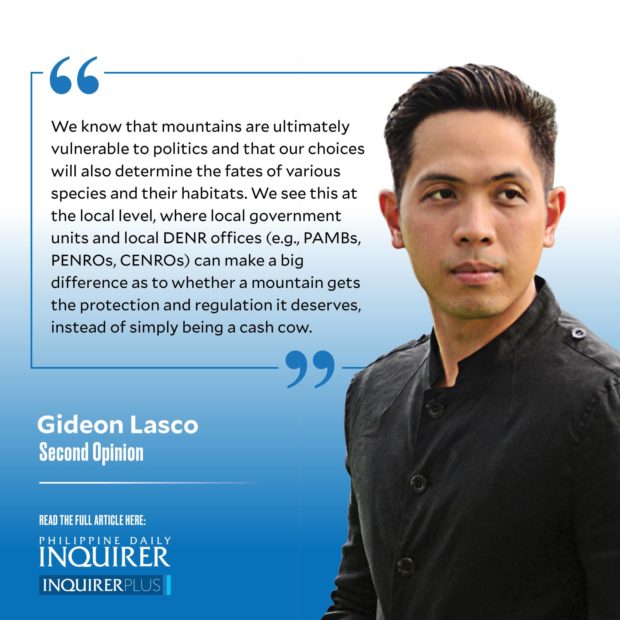Mount Apo above politics
Tinikaran Campsite 2, Mount Apo — It feels great to be back in the country’s highest peak; a symbol of our country and of Mindanao, habitat for numerous endemic species, and for me, home to many beautiful memories. I write this in our campsite surrounded by tinikaran trees after having climbed the 2,954-meter summit, where we were greeted by a spectacular sunrise after an exhilarating ascent from the volcano’s rock face, known as the “Boulders.”
I was a first-year medical student when I first climbed this mountain, accompanied only by two Bagobo guides and fueled by my determination to reach the country’s highest point before I turn 20. Back then, traveling and mountain climbing were so new to me, and my handwritten travel journal (nowadays, I just use a smartphone) reflected a sense of spirituality that I sometimes miss:
Article continues after this advertisementDoubting God [from inside my tent], I mistook the shooting stars for lightning and the running river for rain. I was praying for rain to stop, almost complaining, not knowing that God, in his goodness, has already answered my prayer.I have since come back to climb Mount Apo through different trails, in different stages of my life, each trip giving me inspiration and teaching me something about the environment, our country, and myself. As I climbed more mountains both here and abroad, I have come to appreciate not just the challenge of reaching the summit but the thrill of the trails and the sheer joy of simply being with nature.
I have also seen the detrimental impacts of tourism, even as I have also seen its potential to lead to appreciation, awareness, and advocacy.
And, as I developed new ways of looking at the world, I have come to see how a mountain like Mount Apo can transcend our politics, but also ultimately be subjected to it.
Article continues after this advertisementWe glimpsed at this recently when footage of a Philippine warty pig (Sus philippensis) spotted near the summit went viral, reminding us that beyond our heated politics, other species inhabit our country. Sadly, we didn’t see “Warty” in the summit campsite that, according to our guide Clyde, has become the baboy damo’s home. But we saw signs of it, and we also saw Philippine long-tailed macaques (Macaca fascicularis philippensis) in the Boulders, skirting around the sulfuric vents.
Despite the fact that the country is at the height of election fever, the partisanship also feels distant, and mountaineers from all over the country can come together, exchanging not so much their present political views but past hiking experiences. Indeed, I appreciate that I have always been welcomed by mountaineers all over the country notwithstanding my critical stances, and we have always found common ground on environmental issues.
Even so, we know that mountains are ultimately vulnerable to politics and that our choices will also determine the fates of various species and their habitats. We see this at the local level, where local government units and local DENR offices (e.g., PAMBs, PENROs, CENROs) can make a big difference as to whether a mountain gets the protection and regulation it deserves, instead of simply being a cash cow. For this reason, I appreciate how the municipality of Sta. Cruz has managed to strike a fine balance between protecting their side of Mount Apo and promoting it as an ecotourism destination (for inquiries, you can email tourism.stacruz@gmail.com).
“We are prioritizing how ecotourism can benefit local communities—instead of commercializing the mountain,“ the tourism officer, Julius Paner—himself a mountaineer—told me. He shared that the pandemic has heightened the interest not just in Mount Apo but in other nature destinations in the area like Bamboo Peak and Mount Dinor.
Beyond such efforts, however, there are larger issues that require action at the national level—from policies on mining and logging, to overall approaches to protected areas, as well as indigenous peoples. The vastness of Mount Apo may make a hiker like me feel tiny and insignificant, but such is the impact of humanity upon the planet that we are altering its ecosystems and its very geology, in what scientists call the Anthropocene. Do we have the leadership that recognizes the urgency of our environmental crises—and the will to act on them?
I hope more Filipinos—especially young people—would have the opportunity to climb Mount Apo and other mountains, and that such experiences would inspire them the way they have inspired me.
But for that to happen for generations to come, we need to choose leaders who will see our mountains not as a resource to be exploited—but as a treasure to be protected and cherished.
—————
glasco@inquirer.com.ph

















